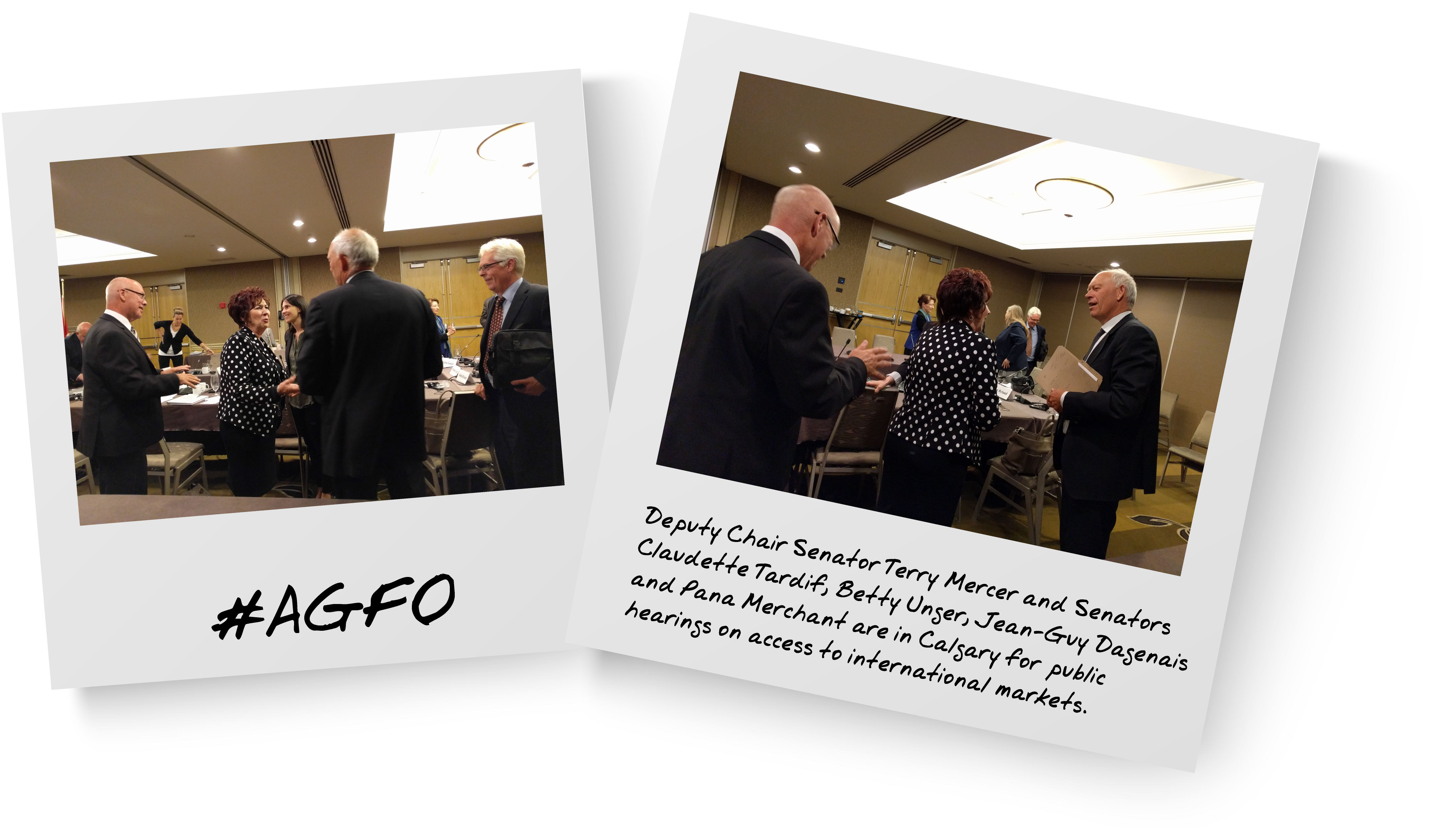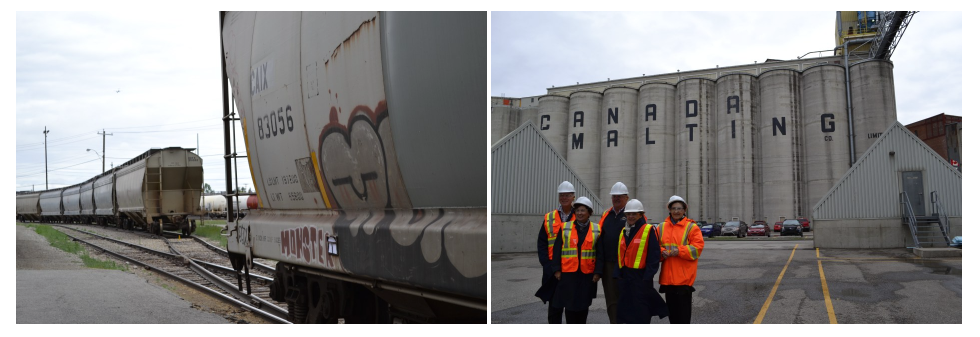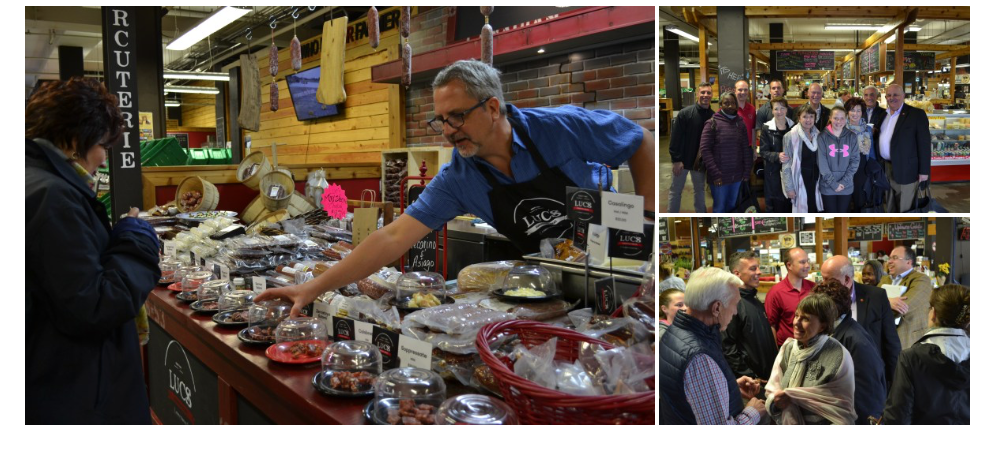International market access for Canada’s agriculture and agri-food sector

The Senate Committee on Agriculture and Forestry travelled to Calgary on a fact-finding mission as part of a study on facilitating international market access for Canada’s agriculture and agri-food sectors.
Canada is the world’s top exporter of agriculture and agri-food products per capita, and those sectors are worth billions to the economy. But impending free trade agreements with the European Union and Pacific Rim countries will change Canada’s ability to compete in international markets.
The committee wants to ensure Canadian products remain on shelves all over the world; to that end the committee is holding public hearings and visiting job sites in Calgary between May 18 and May 20.
For updates from the fact-finding mission and public hearings in Calgary, follow #AGFO and @SenateCA on Twitter.
Calgary, Day 1 : Ratify TPP and CETA, producers urge Senate agriculture committee
Free trade deals like the Trans-Pacific Partnership (TPP) and the Comprehensive and Economic Trade Agreement with the European Union (CETA) will help products from Canadian farms reach new and larger markets across the world, members of the Senate Committee on Agriculture and Forestry heard Wednesday.
It’s a recipe for economic growth in current and emerging markets.
Deputy Chair Senator Terry Mercer and Senators Claudette Tardif, Betty Unger, Jean-Guy Dagenais and Pana Merchant were in Calgary for public hearings on access to international markets.

Through their study of the issue, the Senators are defending the interests of various Canadian stakeholders who are likely to be affected by new trade deals.
Though Canada has yet to ratify the TPP — which would essentially create a free trade zone among 12 Pacific Rim countries — and CETA, witnesses who appeared before the committee generally supported it, as long as non-tariff barriers are addressed.
Existing tariffs act as barriers to trade by limiting the ability of producers to sell their products in foreign markets at competitive rates.

Pulse, oat and canola producers, who are heavily reliant on exports, depend on transportation infrastructure to get their produce from the prairies to the coasts. Growers told the committee they should extend the Fair Rail for Grain Farmers Act, which is set to expire on August 1, 2016.
Public hearings resume Thursday with evidence from the agriculture ministers of Alberta and Saskatchewan, among others.
Calgary, Day 2: Improving access to world markets
Western agriculture producers need improved access to labour and beefed up transportation infrastructure to get their goods to market and improve their contributions to the Canadian economy, a provincial minister told members of the Senate Committee on Agriculture and Forestry.
This sentiment was echoed by the food processing industry, the beef sector and pork producers.
Alberta Minister of Agriculture and Forestry Oneil Carlier, left, and Saskatchewan Minister of Agriculture Lyle Stewart, right, spoke with members of the Senate Committee on Agriculture and Forestry on Thursday, May 20, 2016. Senators Betty Unger, Terry Mercer, Claudette Tardif, Jean-Guy Dagenais and Pana Merchant were in Calgary on a fact-finding mission to discuss ways to improve access to international markets.

Alberta Minister of Agriculture and Forestry Oneil Carlier appeared before the committee on the second day of public hearings. He was broadly supportive of free trade deals like the TPP and CETA with the European Union, which was supported by many of the other witnesses heard today.
These deals reduce both tariff and non-tariff barriers to trade, he said.
Saskatchewan Minister of Agriculture Lyle Stewart agreed.
“If Canada is not part of the TPP, our agriculture sector would face losses due to increased competition from others countries with preferential market access through tariff reductions,” Stewart told the committee.
Senators also met with members of the Cattlemen’s Young Leaders program over lunch. They heard real–life testimony from the next generation of agricultural workers, who expressed optimism about their chosen careers.
“We learned a lot from this motivated group of young professionals. Our agriculture sector is a major contributor to Canada’s economy, and we need to be vigilant in supporting the next generation of agriculture workers,” said Senator Terry Mercer, Deputy Chair of the committee.
Meanwhile, the Earls restaurant’s controversy — in which the chain briefly dropped Canadian beef suppliers in favour of U.S. cattle with the Certified Humane Raised and Handled label — has proved to be a blessing in disguise for the industry, the committee heard.
Witnesses said it has made cattlemen reconsider how they inform the public about how their cattle are sustainably raised.
The committee’s fact-finding mission continues Friday.
Calgary, Day 3: Malt, markets and beef bacon
Senators began their final day of fact-finding Friday with a tour of Calgary’s Canada Malting plant to meet with employees and learn more about the challenges of transporting processed barley and grains via rail.

Members of the Senate Committee on Agriculture and Forestry then toured Crossroads Market, Calgary's largest year-round market and the home of more than 150 vendors. Staff and vendors gave the senators a warm reception before the committee spoke to local farmers, producers and artists.
Over lunch they heard about how important it is for vendors and local producers to have a dedicated space to sell their produce — and how it makes their businesses flourish.

The senators capped off their day with beef bacon and beef sausage while visiting the Canadian Beef Centre of Excellence, where they met with brand experts. The committee learned that beef producers are trying to better educate the public about the humane treatment Alberta cattle receive.
The committee will continue to hear from witnesses in Ottawa; they expect to release a report on their findings — which will help shape Canada’s trade policies during delicate negotiations with Europe and Pacific Rim countries — next year.
Related articles
Tags
Committee news
International market access for Canada’s agriculture and agri-food sector

The Senate Committee on Agriculture and Forestry travelled to Calgary on a fact-finding mission as part of a study on facilitating international market access for Canada’s agriculture and agri-food sectors.
Canada is the world’s top exporter of agriculture and agri-food products per capita, and those sectors are worth billions to the economy. But impending free trade agreements with the European Union and Pacific Rim countries will change Canada’s ability to compete in international markets.
The committee wants to ensure Canadian products remain on shelves all over the world; to that end the committee is holding public hearings and visiting job sites in Calgary between May 18 and May 20.
For updates from the fact-finding mission and public hearings in Calgary, follow #AGFO and @SenateCA on Twitter.
Calgary, Day 1 : Ratify TPP and CETA, producers urge Senate agriculture committee
Free trade deals like the Trans-Pacific Partnership (TPP) and the Comprehensive and Economic Trade Agreement with the European Union (CETA) will help products from Canadian farms reach new and larger markets across the world, members of the Senate Committee on Agriculture and Forestry heard Wednesday.
It’s a recipe for economic growth in current and emerging markets.
Deputy Chair Senator Terry Mercer and Senators Claudette Tardif, Betty Unger, Jean-Guy Dagenais and Pana Merchant were in Calgary for public hearings on access to international markets.

Through their study of the issue, the Senators are defending the interests of various Canadian stakeholders who are likely to be affected by new trade deals.
Though Canada has yet to ratify the TPP — which would essentially create a free trade zone among 12 Pacific Rim countries — and CETA, witnesses who appeared before the committee generally supported it, as long as non-tariff barriers are addressed.
Existing tariffs act as barriers to trade by limiting the ability of producers to sell their products in foreign markets at competitive rates.

Pulse, oat and canola producers, who are heavily reliant on exports, depend on transportation infrastructure to get their produce from the prairies to the coasts. Growers told the committee they should extend the Fair Rail for Grain Farmers Act, which is set to expire on August 1, 2016.
Public hearings resume Thursday with evidence from the agriculture ministers of Alberta and Saskatchewan, among others.
Calgary, Day 2: Improving access to world markets
Western agriculture producers need improved access to labour and beefed up transportation infrastructure to get their goods to market and improve their contributions to the Canadian economy, a provincial minister told members of the Senate Committee on Agriculture and Forestry.
This sentiment was echoed by the food processing industry, the beef sector and pork producers.
Alberta Minister of Agriculture and Forestry Oneil Carlier, left, and Saskatchewan Minister of Agriculture Lyle Stewart, right, spoke with members of the Senate Committee on Agriculture and Forestry on Thursday, May 20, 2016. Senators Betty Unger, Terry Mercer, Claudette Tardif, Jean-Guy Dagenais and Pana Merchant were in Calgary on a fact-finding mission to discuss ways to improve access to international markets.

Alberta Minister of Agriculture and Forestry Oneil Carlier appeared before the committee on the second day of public hearings. He was broadly supportive of free trade deals like the TPP and CETA with the European Union, which was supported by many of the other witnesses heard today.
These deals reduce both tariff and non-tariff barriers to trade, he said.
Saskatchewan Minister of Agriculture Lyle Stewart agreed.
“If Canada is not part of the TPP, our agriculture sector would face losses due to increased competition from others countries with preferential market access through tariff reductions,” Stewart told the committee.
Senators also met with members of the Cattlemen’s Young Leaders program over lunch. They heard real–life testimony from the next generation of agricultural workers, who expressed optimism about their chosen careers.
“We learned a lot from this motivated group of young professionals. Our agriculture sector is a major contributor to Canada’s economy, and we need to be vigilant in supporting the next generation of agriculture workers,” said Senator Terry Mercer, Deputy Chair of the committee.
Meanwhile, the Earls restaurant’s controversy — in which the chain briefly dropped Canadian beef suppliers in favour of U.S. cattle with the Certified Humane Raised and Handled label — has proved to be a blessing in disguise for the industry, the committee heard.
Witnesses said it has made cattlemen reconsider how they inform the public about how their cattle are sustainably raised.
The committee’s fact-finding mission continues Friday.
Calgary, Day 3: Malt, markets and beef bacon
Senators began their final day of fact-finding Friday with a tour of Calgary’s Canada Malting plant to meet with employees and learn more about the challenges of transporting processed barley and grains via rail.

Members of the Senate Committee on Agriculture and Forestry then toured Crossroads Market, Calgary's largest year-round market and the home of more than 150 vendors. Staff and vendors gave the senators a warm reception before the committee spoke to local farmers, producers and artists.
Over lunch they heard about how important it is for vendors and local producers to have a dedicated space to sell their produce — and how it makes their businesses flourish.

The senators capped off their day with beef bacon and beef sausage while visiting the Canadian Beef Centre of Excellence, where they met with brand experts. The committee learned that beef producers are trying to better educate the public about the humane treatment Alberta cattle receive.
The committee will continue to hear from witnesses in Ottawa; they expect to release a report on their findings — which will help shape Canada’s trade policies during delicate negotiations with Europe and Pacific Rim countries — next year.


